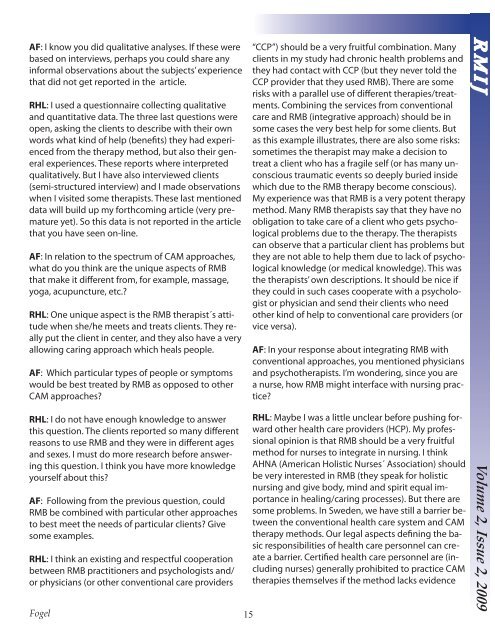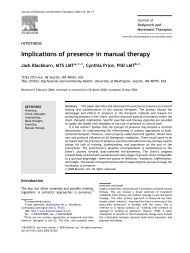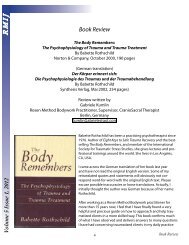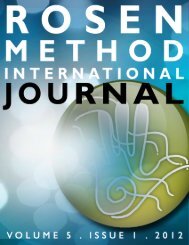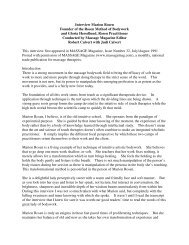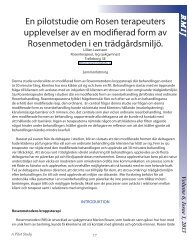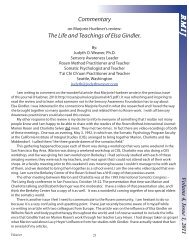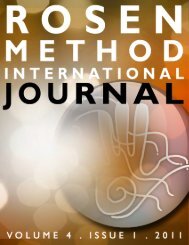RMIJ ... - Rosen Journal
RMIJ ... - Rosen Journal
RMIJ ... - Rosen Journal
Create successful ePaper yourself
Turn your PDF publications into a flip-book with our unique Google optimized e-Paper software.
AF: I know you did qualitative analyses. If these were<br />
based on interviews, perhaps you could share any<br />
informal observations about the subjects’ experience<br />
that did not get reported in the article.<br />
RHL: I used a questionnaire collecting qualitative<br />
and quantitative data. The three last questions were<br />
open, asking the clients to describe with their own<br />
words what kind of help (benefits) they had experienced<br />
from the therapy method, but also their general<br />
experiences. These reports where interpreted<br />
qualitatively. But I have also interviewed clients<br />
(semi-structured interview) and I made observations<br />
when I visited some therapists. These last mentioned<br />
data will build up my forthcoming article (very premature<br />
yet). So this data is not reported in the article<br />
that you have seen on-line.<br />
AF: In relation to the spectrum of CAM approaches,<br />
what do you think are the unique aspects of RMB<br />
that make it different from, for example, massage,<br />
yoga, acupuncture, etc.?<br />
RHL: One unique aspect is the RMB therapist´s attitude<br />
when she/he meets and treats clients. They really<br />
put the client in center, and they also have a very<br />
allowing caring approach which heals people.<br />
AF: Which particular types of people or symptoms<br />
would be best treated by RMB as opposed to other<br />
CAM approaches?<br />
RHL: I do not have enough knowledge to answer<br />
this question. The clients reported so many different<br />
reasons to use RMB and they were in different ages<br />
and sexes. I must do more research before answering<br />
this question. I think you have more knowledge<br />
yourself about this?<br />
AF: Following from the previous question, could<br />
RMB be combined with particular other approaches<br />
to best meet the needs of particular clients? Give<br />
some examples.<br />
RHL: I think an existing and respectful cooperation<br />
between RMB practitioners and psychologists and/<br />
or physicians (or other conventional care providers<br />
Fogel<br />
15<br />
“CCP”) should be a very fruitful combination. Many<br />
clients in my study had chronic health problems and<br />
they had contact with CCP (but they never told the<br />
CCP provider that they used RMB). There are some<br />
risks with a parallel use of different therapies/treatments.<br />
Combining the services from conventional<br />
care and RMB (integrative approach) should be in<br />
some cases the very best help for some clients. But<br />
as this example illustrates, there are also some risks:<br />
sometimes the therapist may make a decision to<br />
treat a client who has a fragile self (or has many unconscious<br />
traumatic events so deeply buried inside<br />
which due to the RMB therapy become conscious).<br />
My experience was that RMB is a very potent therapy<br />
method. Many RMB therapists say that they have no<br />
obligation to take care of a client who gets psychological<br />
problems due to the therapy. The therapists<br />
can observe that a particular client has problems but<br />
they are not able to help them due to lack of psychological<br />
knowledge (or medical knowledge). This was<br />
the therapists’ own descriptions. It should be nice if<br />
they could in such cases cooperate with a psychologist<br />
or physician and send their clients who need<br />
other kind of help to conventional care providers (or<br />
vice versa).<br />
AF: In your response about integrating RMB with<br />
conventional approaches, you mentioned physicians<br />
and psychotherapists. I’m wondering, since you are<br />
a nurse, how RMB might interface with nursing practice?<br />
RHL: Maybe I was a little unclear before pushing forward<br />
other health care providers (HCP). My professional<br />
opinion is that RMB should be a very fruitful<br />
method for nurses to integrate in nursing. I think<br />
AHNA (American Holistic Nurses´ Association) should<br />
be very interested in RMB (they speak for holistic<br />
nursing and give body, mind and spirit equal importance<br />
in healing/caring processes). But there are<br />
some problems. In Sweden, we have still a barrier between<br />
the conventional health care system and CAM<br />
therapy methods. Our legal aspects defining the basic<br />
responsibilities of health care personnel can create<br />
a barrier. Certified health care personnel are (including<br />
nurses) generally prohibited to practice CAM<br />
therapies themselves if the method lacks evidence<br />
<strong>RMIJ</strong> Volume 2, Issue 2, 2009


